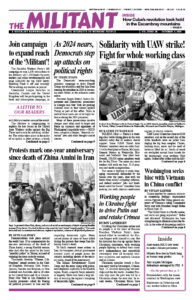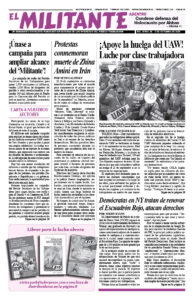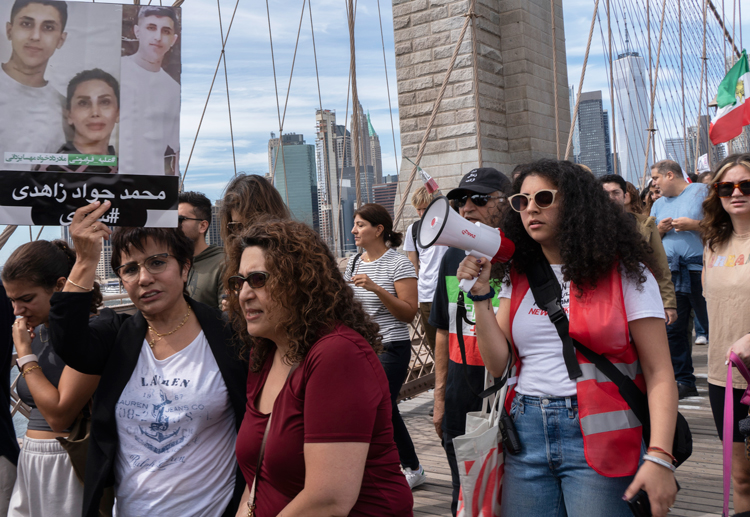Demonstrations took place around the world Sept. 16 to commemorate the one-year anniversary of the death of Zhina Amini, a young Kurdish woman who died after her arrest by the hated “morality police” in Tehran, accused of violating the dress code for women.
Thousands chanting “Women, Life, Freedom” joined protests in the United Kingdom, Germany, Italy, France, Austria, Sweden and Belgium; in New Zealand and Australia; and in 18 cities in the United States and 10 in Canada. From New York to San Francisco to London protesters called for freeing all political prisoners in Iran and for respecting democratic rights. Many carried photos of some of those killed during the protests that swept Iran following Amini’s death.
To block renewed street actions in Iran, the bourgeois clerical government arrested scores of people across the country, including leaders of the teachers union, ahead of the anniversary.
The Islamic Revolutionary Guard Corps and the army, along with police, were deployed, especially in the Kurdish region. Kurds, a mostly Sunni minority in majority Shiite Iran, have a long history of resisting the regime’s trampling of democratic rights.
In Amini’s hometown of Saqqez, the regime stationed troops, snipers and armed vehicles. Government forces released water from a dam, flooding stream beds around the cemetery where she is buried to prevent people from getting to her graveside for the ceremony that her parents had announced. Her father was placed under house arrest.
But in a sign of the regime’s weakness, a strike called by a coalition of Kurdish groups shut down businesses in at least 18 cities in the Kurdish region and in Zahedan, the capital of Sistan-Baluchistan, home to the Baluch people, another mostly Sunni oppressed nationality. Government forces opened fire in the Kurdish cities of Kermanshah and Mahabad, injuring several protesters.
The day before, thousands demonstrated in Zahedan, as they have almost every week for nearly a year. “An attack on Kurdistan is an attack on Baluchistan,” read signs at the protest. Another popular slogan was “Kurds, Baluch, Azerbaijani, Turkish Equality,” referring to various oppressed minorities.
Decreased religious, ethnic prejudice
“The biggest sign of the awakening of the Iranian nation is that ethnic and religious prejudices have greatly decreased,” Sunni cleric Abdul-Hamid told protesters before the march began. Iranians “respect each other’s language and dress and everyone has compassion for each other.”
“Shias and Sunnis, Muslims and non-Muslims, everyone respects each other,” he added. Week after week Abdul-Hamid has called on the regime to free all the political prisoners and to stop attacking the protests. “The Iranian nation,” he said “wants justice and freedom.”
During the four months of protests following the death of Amini, some 500 protesters were killed by the regime’s thugs and hundreds were injured. In the largest single massacre, several dozen were killed or wounded outside the mosque in Zahedan Sept. 30, 2022, when police snipers opened fire. Defenders of Baluch rights have called for a strike on Sept. 30, the anniversary of Bloody Friday.
Weekly Sunday, Monday and Tuesday protests by retirees demanding an increase in social security benefits to match double-digit inflation took place as usual across the country.
A shift in attitudes marked by the protests during the last year is continuing to widen fractures inside the regime.
A recent article in Javan, one of the newspapers run by the Islamic Revolutionary Guard Corps, noted that the actions of the “Guidance Patrol” — the official name of the “morality police” — have backfired.
The patrol is supposed to “guide” women to wear a headscarf that covers all their hair and dress modestly. But the image people now have “is that the police are violent,” Javan complains, and that they “grab girls and throw them in the van.”
Despite the regime’s efforts, growing number of people believe that how women dress is an individual choice. A recently circulated video shows two women riding a motorcycle together in Tehran, even though women are not allowed to get motorcycle driver’s licenses. One is wearing a hijab. The other woman’s hair blows freely in the wind.


